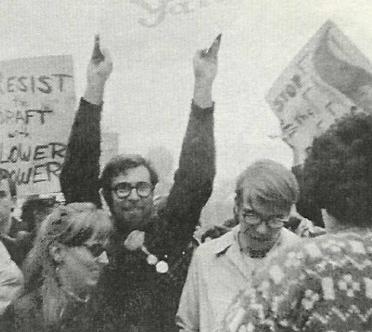Stories
By the time the US escalated the War in Vietnam in early 1965, I was already beginning to be concerned about war and peace issues. Like most people, I was glued to the television set at the end of 1962 during the Cuban Missile Crisis, worried that we could be drawn into a nuclear war. I had become aware of the campaign of the Women Strike for Peace against nuclear testing and that of the SANE Nuclear Policy Organization pressing for nuclear disarmament. Along with visits to peace groups on my way out west in 1964, this became material for my novel, By What Ways
But my first real activism came in response to the 1965 escalation of the war. At first I thought it was simply an error of judgment by the US government, and that they would soon realize their error and correct it, but I was soon to receive a dramatic lesson of my naivete, which I have never forgotten, and which still makes me angry when I think about it.
I went to several teach-ins at Yale Law School where a Professor Benda was eloquent in his criticisms of the war, and the Dean of the Law School, Professor Rostow, defended the war by calling its critics "naive."
Along with Nina, to whom I was now engaged to be married, I joined an ad-hoc group against the war called the Yale-New Haven Committee against the War in Vietnam. At Yale, Reverend Sloan Coffin organized a counter-group, which excluded radicals and took a less critical view of the war. Our group held a few small demonstrations against the war on the New Haven Green and were attacked. One Eastern European immigre ran his car into the middle of the demonstration and we were lucky nobody was badly hurt. FBI agents came to the demonstrations and photographed everyone, implicitly threatening the future of our careers.
At first the media refused to mention the anti-war protests, but then in the summer of 1965, ABC news approached our little group and invited us to take part in a filming of anti-war protest that would be done on the Yale campus. Naively, we took part. They chose me because I had a beard, and another girl because she had the stereotypically long hair of the "hippy" generation, and they gave us the ground rules: "No facts, we don't have time for that." Outside the building there was a picket line of pro-war Yalies yelling obscenities at us and accusing us of being communists.
When they turned the cameras on me, I tried to say why I was opposed to the war, saying that you could not impose democracy by force of arms, etc. Immediately, they stopped the cameras. "Cut! We told you not to talk about facts."
The following Sunday we watched the broadcast, along with millions of other Americans because it was on one of the popular Sunday talk shows like Meet the Press. The commentator was Howard K. Smith. For 25 minutes you had brief snippets of young people with beards and long hair making innane comments such as "I can't sleep at night because of the war" and "Jesus would have been against it." No facts. No time for that.
Then, in the last 5 minutes of the broadcast, Howard K. Smith came on the screen and said, "You have heard from the young people of our country who are opposed to our war in Vietnam. Unfortunately, they are not well educated and they do not know the facts." Then he pulled down a wall-map of Vietnam and gave a version of the "facts" that had been invented by the State Department, and the program was over.
I felt as if I had just been raped in front of millions of people! I was so angry that I threw my shoe at the television.
I have never forgotten that moment and that anger and it stays with me as vivid as if it were yesterday, fueling my activism and reminding me of the power of the government and the media who are like the distorting mirrors in the carnival. We look into the television expecting to see ourselves, but instead we see distorted images, faces of ignorance, hatred and violence, even when it is our own face.
Once, years later, Howard K. Smith came to give a speech at Yale. I wanted to go and confront him, but Nina said "no" because I was up for tenure at the university at the time and perhaps it could have been used against me. In fact, there were things used against me, but not this exactly.

Here I am in a demonstration with David Rounds and his wife Susan
Fortunately, I was able to harness my anger into activism, beginning in 1966 with the Cook for Congress Campaign and its sequel, the American Independent Movement.
 |
Stages
1986-1992
Fall of Soviet Empire
1992-1997
UNESCO Culture of Peace Programme